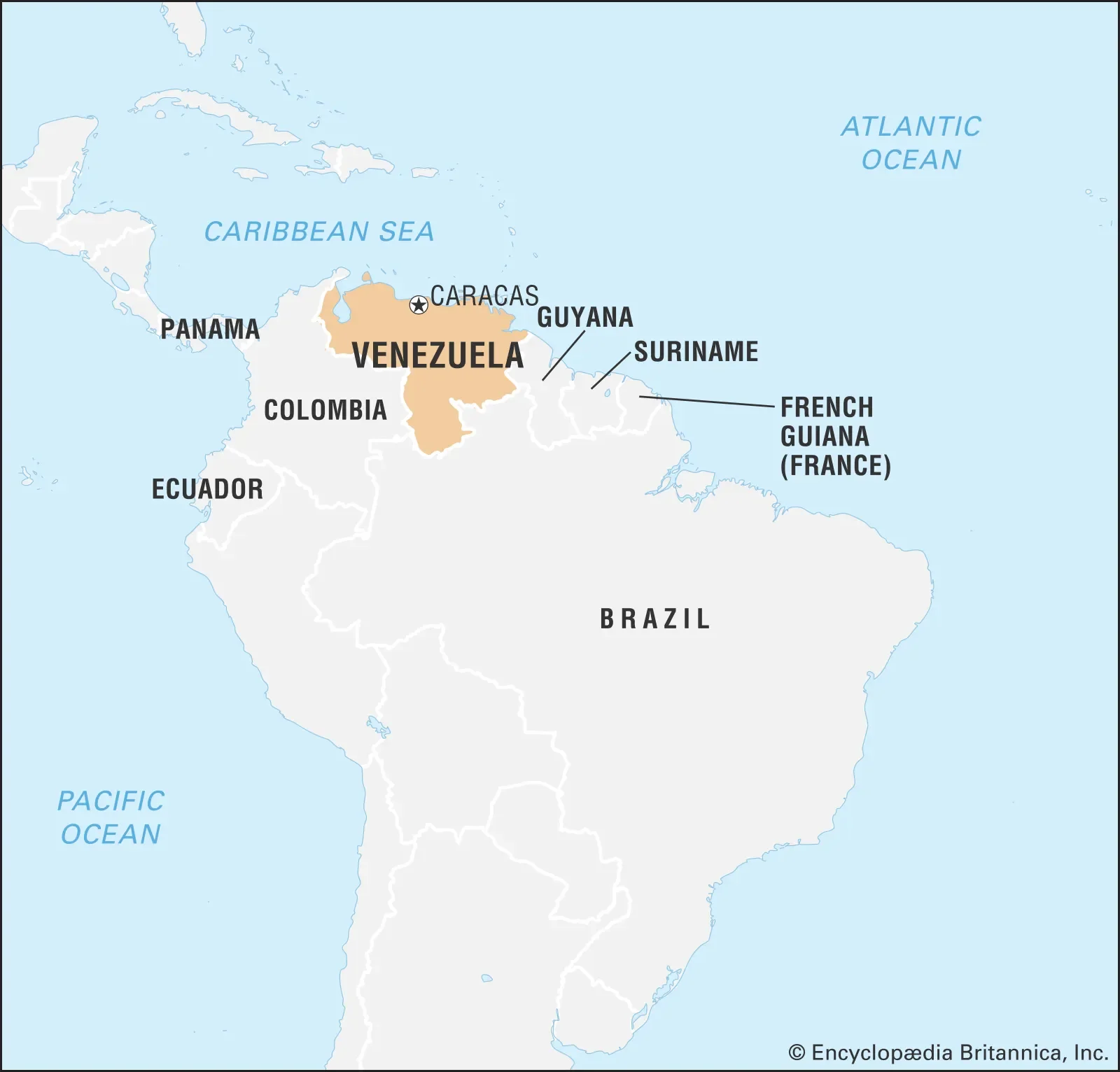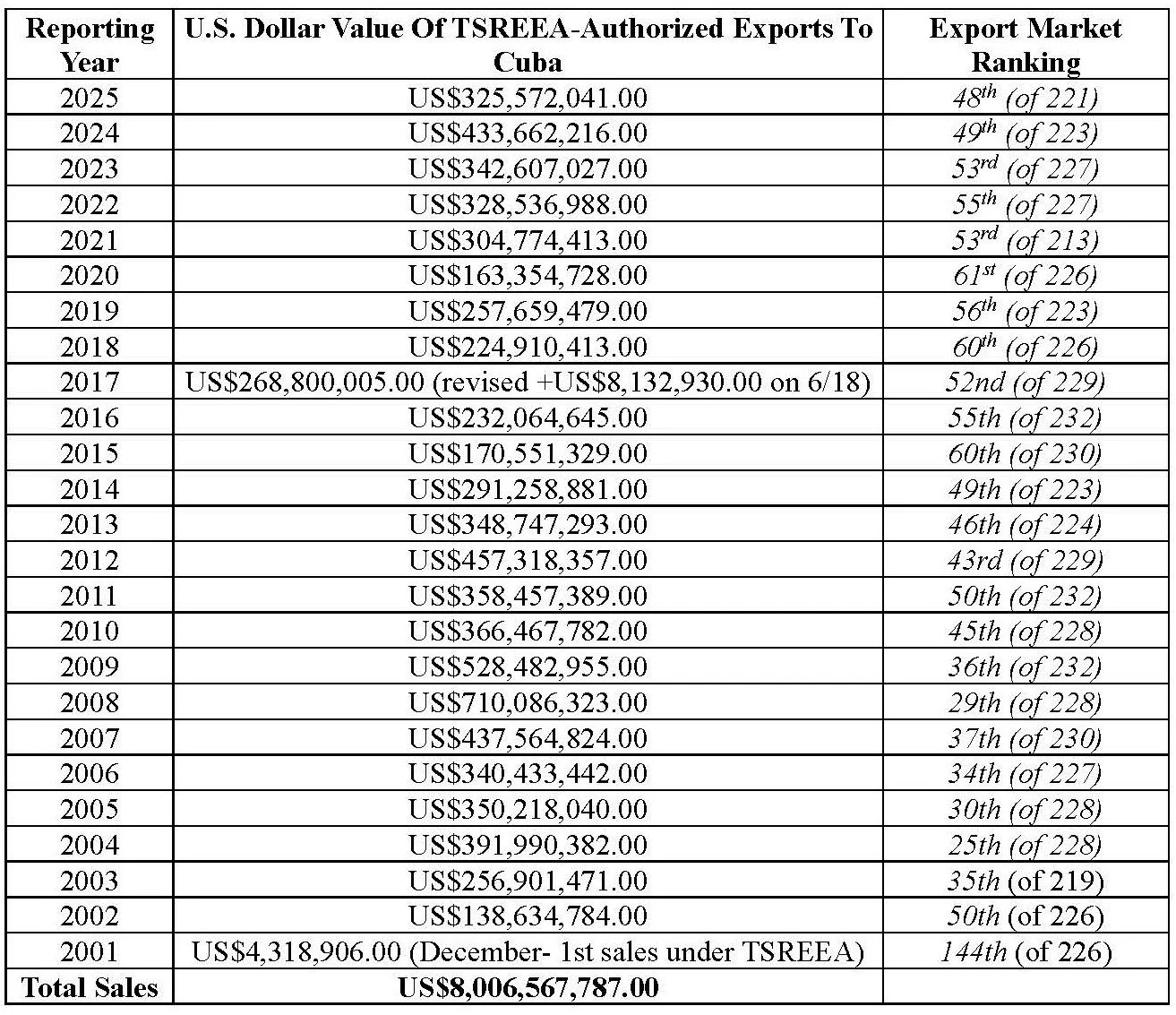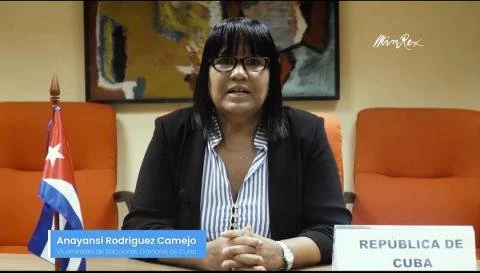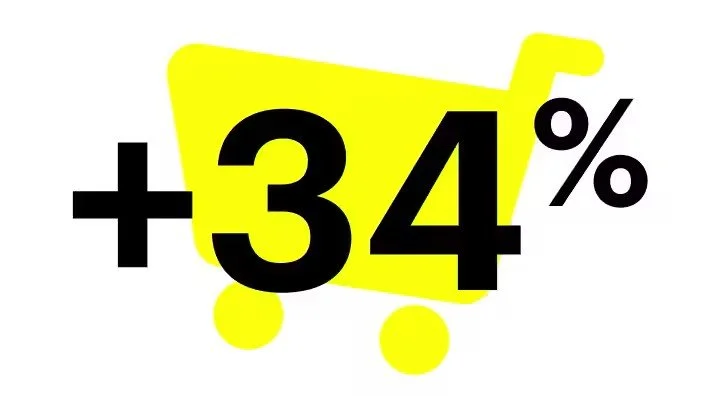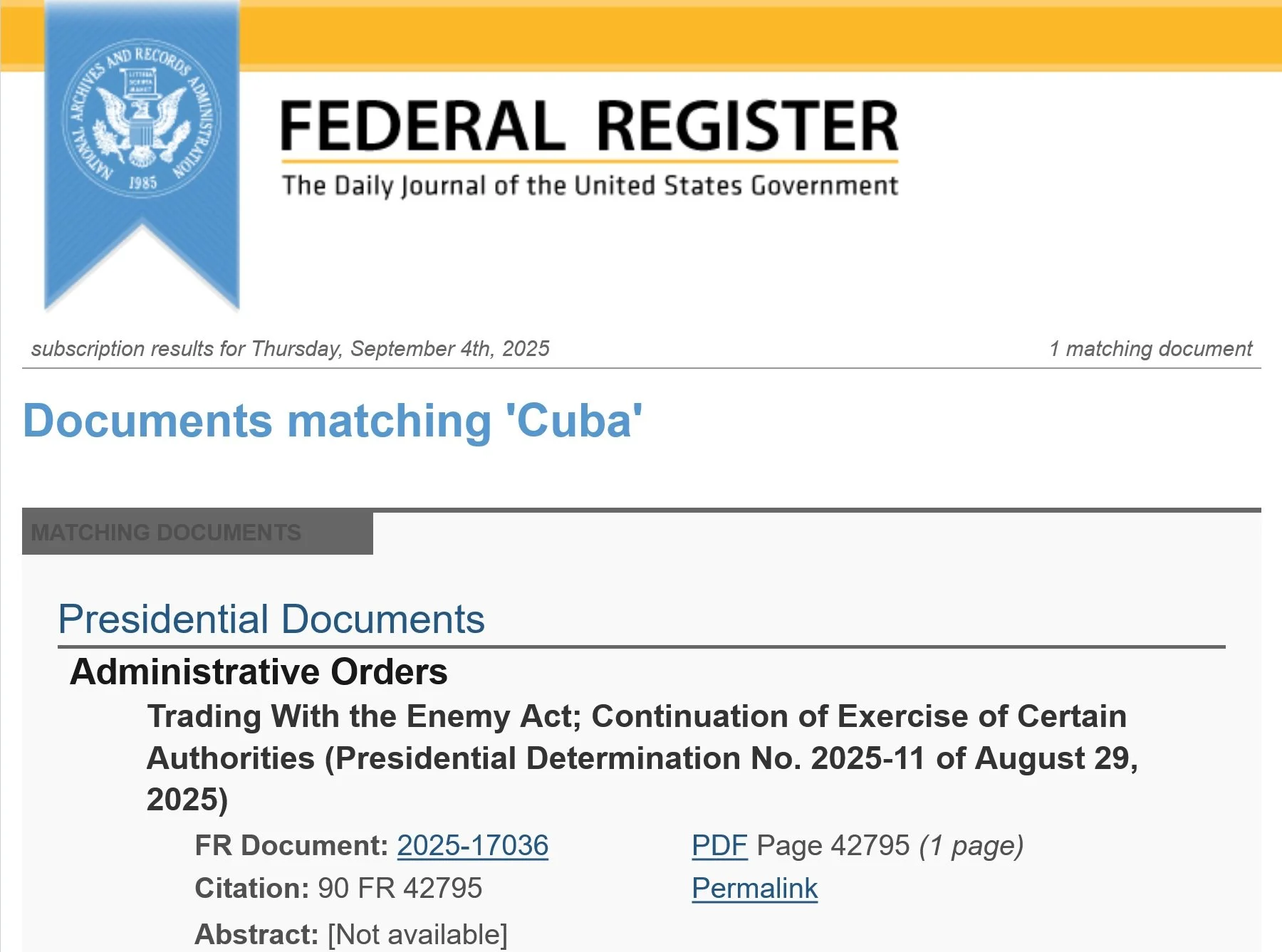Why Does The Government Of The Republic Of Cuba Continue To Exaggerate Unnecessarily At The United Nations (UN) About The Impact On Purchases From United States Companies Using Provisions Within The CDA And TSREEA, And Authorizations By The BIS And United States Department Of State?
Since 2001, United States Companies Have Exported More Than US$8 Billion In Products To The Republic Of Cuba- With Purchasers Both Government-Operated Companies And Re-Emerging Private Sector
There is no reasonable debate using export data, import data, and exporter statements where the outcome supports that policies, regulations, and statutes do not constrain and restrain the export of products from the United States to the Republic of Cuba and imports from the Republic of Cuba to the United States. There can be and is debate as to the impact of the impact, qualifying and quantifying the level of deterrents and inconveniences.
Could there be an increase in United States exports to the Republic of Cuba within existing policies, regulations, and statutes in place by the government of the United States and the government of the Republic of Cuba? Yes. There is shared responsibility for Washington DC and Havana. The two most important: Washington DC could authorize direct correspondent banking. Havana could authorize the direct investment into and the direct financing for privately-owned companies- which the Biden-Harris Administration (2021-2025) authorized on 10 May 2022.
Link: Biden-Harris Administration Approves First Equity Investment Since 1960 In A Private Cuban Company May 10, 2022
Link: With U.S. Government Authorization For First Direct Equity Investment Into A Private Company In Cuba, Here Is Important Context And Details. About The Parties; About The Message. May 16, 2022
Three statements by Anayansi Rodríguez Camejo, Deputy Minister of Foreign Affairs of the Republic of Cuba, at the Human Rights Council (HRC) of the United Nations (UN).
“For more than six decades, the Cuban people have been facing the consequences of an ironclad economic, commercial and financial blockade imposed by the United States Government…” Anayansi Rodríguez Camejo, Deputy Minister of Foreign Affairs of the Republic of Cuba
Reality:
Since 2022, when the first Bureau of Industry and Security (BIS) of the United States Department of Commerce license was issued for the export of vehicles to Republic of Cuba nationals and to private companies in the Republic of Cuba, the cumulative export value of the initiatives in place during the Obama-Biden Administration, Trump-Pence Administration, Biden-Harris Administration, and Trump-Vance Administration exceeds US$191 million of which electric and gasoline-powered new and used vehicles, bicycles, trucks, motorcycles and mopeds, and parts, exceeds US$128 million (January 2025 through July 2025: US$50,288,310.00; year 2024: US$67,241,234.00; year 2023: US$10,546,419.00; year 2022: US$89,848.00 by the end of 2025 and purchases (equipment and products) for use by the re-emerging private sector in the Republic of Cuba driving the growth.
The following data is a guide with approximate values for non-agricultural commodity and food product exports from the United States to the Republic of Cuba. Primarily products (including vehicles) used for the benefit of the re-emerging private sector in the Republic of Cuba and Republic of Cuba nationals.
Year Approximate U.S. Dollar Value
2015 US$4,836,627.00
2016 US$7,644,628.00
2017 US$11,137,712.00
2018 US$32,690,672.00
2019 US$21,144,294.00
2020 US$10,326,641.00
2021 US$5,204,355.00
2022 US$11,812,859.00
2023 US$30,334,066.00
2024 US$85,615,889.00
2025 US$63,891,338.00 (through July)
Total US$284,639,081.00
Link: Since 2022, US$191+ Million U.S. Exports To Cuba's Re-Emerging Private Sector- Including US$128 Million In Vehicles September 08, 2025
In 2008, the highest value year, for example, the government of the Republic of Cuba purchased US$717,878,764.00 in agricultural commodities and food products from United States-based companies. The transactions were on a cash-in-advance basis as required by the Trade Sanctions Reform and Export Enhancement Act (TSREEA) of 2000, which re-authorized the direct export of agricultural commodities and food products from the United States to the Republic of Cuba. The Cuban Democracy Act (CDA) of 1992 re-authorized the direct export of healthcare products (medical equipment, medical instruments, medical supplies, medicines, and pharmaceuticals from the United States to the Republic of Cuba. Payment terms are authorized within the CDA.
Link To 2008 Export List In PDF Format
“… impact of a policy that threatens the food security of our population, as it prevents the acquisition of fertilizers, agricultural machinery, fuels, chemical products and essential technologies to guarantee national food production.” Anayansi Rodríguez Camejo, Deputy Minister of Foreign Affairs of the Republic of Cuba
Reality:
In 2017, Deere & Company (2024 revenues approximately US$61.3 billion) established a distribution center in the Republic of Cuba, joining San Juan, Puerto Rico-based RIMCO, the Republic of Cuba distributor for Irving, Texas-based Caterpillar Inc. (2024 revenues US$66.5 billion) established the same year. At the time, neither Deere & Company nor Caterpillar issued media releases or posted information on their respective Internet sites.
Since November 2017, Deere & Company delivered nearing US$2 million in agricultural equipment to the Republic of Cuba for use at its distribution center. Antioch, Tennessee-based Wirtgen America, Inc., a subsidiary of Windhagen, Germany-based Wirtgen Group (2020 revenues approximately US$3 billion), a construction equipment machinery subsidiary (acquired in 2017) of Deere & Company has also delivered products to the Republic of Cuba. RIMCO continues to deliver equipment for use at its distribution center in the Republic of Cuba, including excavators, backhoes, graders, scrapers, bulldozers, railway fixtures, and signaling equipment, valued at more than US$4 million since December 2018. John Deere Financial Services was to provide payment terms/financing for the exports, primarily Series 5000 (price range US$25,000.00 to US$80,000.00) with a limited quantity of Series 7000 (price range US$219,000.00 to US$280,000.00). According to the company, several hundred tractors, parts and accessories may be exported from the United States to the Republic of Cuba during the next four years, with the first deliveries (for testing and evaluation) scheduled for mid-November 2017. The potential value of the several hundred products exported from the United States to the Republic of Cuba that would be financed could range from US$9 million to US$30 million. John Deere Financial Services has not commented as to whether the product sales goals have been achieved or if there have been issues relating to the receipt of payments. Caterpillar has not disclosed if the company has provided payment terms for its products exported to the Republic of Cuba.
Since December 2017, Boston, Massachusetts-based General Electric (GE; 2024 revenues approximately US$64.6 billion) delivered from the United States to the Republic of Cuba “parts for steam turbines” valued at more than US$21 million. Some of the parts traveled from Atlanta, Georgia, to Port Everglades, Florida, then to Port Mariel in the Republic of Cuba. GE is the largest (by revenue) United States-based industrial company to have engaged with the Republic of Cuba. Although GE has not issued a media release relating to the project in the Republic of Cuba, in 2017 the government of the Republic of Cuba confirmed in a PowerPoint presentation used by the Embassy of the Republic of Cuba in Washington DC that the company was providing parts and equipment for a power plant. The total value of the project has not been reported. The Obama Administration first authorized the transactions by GE as primarily advancing benefit to the citizens of the Republic of Cuba rather than to the government of the Republic of Cuba. This type of transaction was and remains licensable (general or specific) through the OFAC and BIS. In November 2015, GE purchased for approximately US$10.6 billion the power and grid division of Paris, France-based Alstom (2018 revenues approximately US$8 billion). In 2016, GE commenced a power generation project in the Republic of Cuba resulting, in part, from a relationship between Alstom and the Republic of Cuba prior to the 2015 acquisition by GE of the power and grid division of Alstom, which had exported products to the Republic of Cuba. On 31 March 1971, GE certified a claim against the Republic of Cuba in the amount of US$5,870,436.86 through the United States Foreign Claims Settlement Commission (USFCSC) within the United States Department of Justice. Interest accrued at 6% per annum from the respective date(s) of loss to the date of settlement.
“… blockade hinders and disrupts even the arrival of supplies already paid for, affecting the availability of basic commodities such as rice, beans, powdered milk, oil, meat, bread and coffee.” Anayansi Rodríguez Camejo, Deputy Minister of Foreign Affairs of the Republic of Cuba
Reality:
United States exports to the Republic of Cuba (government-operated entities and the re-emerging private sectors) were US$285,709,353.00 for the period January 2025 through July 2025 compared to US$242,085,953.00 for the period January 2024 through July 2024, representing an 18.0% increase year-to-year representing. The data contains information on exports from the United States to the Republic of Cuba- products within the TSREEA and regulations implemented (1992 to present) for other products by the Office of Foreign Assets Control (OFAC) of the United States Department of the Treasury, Bureau of Industry and Security (BIS) of the United States Department of Commerce, and United States Department of State.
Link To Complete Report In Pdf Format
Link To Complete List Of Products In 2024 Exported From The United States To Cuba
Link To Complete List Of Products In 2023 Exported From The United States To Cuba
Year Value Of TSREEA Exports
2025 US$285,709,353.00
2024 US$433,662,216.00
2023 US$342,607,027.00
2022 US$328,536,988.00
2021 US$304,774,413.00
2020 US$163,354,728.00
2019 US$257,659,479.00
2018 US$224,910,413.00
2017 US$268,800,005.00 (revised +US$8,132,930.00 on 6/18)
2016 US$232,064,645.00
2015 US$170,551,329.00
2014 US$291,258,881.00
2013 US$348,747,293.00
2012 US$457,318,357.00
2011 US$358,457,389.00
2010 US$366,467,782.00
2009 US$528,482,955.00
2008 US$710,086,323.00
2007 US$437,564,824.00
2006 US$340,433,442.00
2005 US$350,218,040.00
2004 US$391,990,382.00
2003 US$256,901,471.00
2002 US$138,634,784.00
2001 US$4,318,906.00 (December- 1st sales under TSREEA)
Total Sales US$7,966,705,182.00
Ministry of Foreign Affairs
Havana, Republic of Cuba
12 September 2025
Cuba denounces the impact of the blockade on the right to food at the Human Rights Council
Geneva, September 12, 2025.- The Deputy Minister of Foreign Affairs, Anayansi Rodríguez Camejo, denounced before the Human Rights Council (HRC) of the United Nations (UN), the impact of the blockade imposed by the United States on the right to food and food security of the Cuban people.
The Cuban Deputy Foreign Minister intervened, in virtual format, in the Biennial Panel on Unilateral Coercive Measures of the 60th session of the UNHRC, and pointed out that the U.S. policy towards the island had caused damage to the Cuban agri-food sector for more than 441 million dollars between March 2023 and February 2024 alone. He also exemplified how extraterritorial pressure measures prevent and hinder the acquisition of fertilizers, agricultural machinery, fuels, chemical products and essential technologies to guarantee food production. He illustrated the consequences of the blockade for Cuba's access to financing for agricultural development programs, modernization of rural infrastructures and adaptation to climate change.
The central theme of the Biennial Panel was "Impact of Unilateral Coercive Measures and Excessive Compliance on the Right to Food and Food Security". It was attended by the United Nations High Commissioner for Human Rights, Volker Türk; the Special Rapporteur on Unilateral Coercive Measures, Alena Douhan; the Special Rapporteur on the right to food, Michael Fakhri; the independent expert on Foreign Debt, Attiya Waris; as well as representatives of governments and civil society.
Related information:
Intervention of the Deputy Minister of Foreign Affairs, Anayansi Rodríguez Camejo, at the Biennial Panel on Unilateral Coercive Measures. Geneva, 12 September 2025.
Mr. President, We are grateful to the Office of the High Commissioner for its efforts to fulfil the mandate of organizing this biennial panel, in the difficult context of the liquidity crisis facing the United Nations. For more than six decades, the Cuban people have been facing the consequences of an ironclad economic, commercial and financial blockade imposed by the United States Government, which has been intensified in recent years with new pressure measures, extraterritorial actions and financial restrictions. This unilateral policy constitutes a massive, flagrant and systematic violation of the human rights of the Cuban people, and directly affects national food security, limiting access to inputs, technologies, financing and international cooperation.
During the period between March 2023 and February 2024, the damage caused by the blockade in the Cuban agri-food sector amounted to more than 441 million dollars. This figure not only represents an economic loss, but also reflects the human impact of a policy that threatens the food security of our population, as it prevents the acquisition of fertilizers, agricultural machinery, fuels, chemical products and essential technologies to guarantee national food production.
The blockade hinders and disrupts even the arrival of supplies already paid for, affecting the availability of basic commodities such as rice, beans, powdered milk, oil, meat, bread and coffee. The chilling effect of the embargo has even reached entities of the United Nations system. In 2024, the Food and Agriculture Organization of the United Nations (FAO) attempted to procure tractors for small Cuban producers worth $1.5 million, but the manufacturer refused to take the risk of trading with Cuba, due to U.S. coercion.
Mr. President, The embargo has also restricted Cuba's access to external multilateral financing for agricultural development programs, modernization of rural infrastructure, and strengthening climate resilience. This limitation affects the Cuban state's ability to guarantee an adequate standard of living, especially in a context marked by global crises, economic volatility and environmental challenges. Various mandate-holders of this Council have been categorical in pointing out that unilateral coercive measures, such as the blockade, contravene international law, the principle of non-intervention in the internal affairs of States and the purposes of the Charter of the United Nations. In January 2024, Special Rapporteur Alena Douhan, together with the special procedures on the right to food, the right to development, extreme poverty and human rights, sent a joint communication to the Government of the United States, in which they described the blockade as a serious violation of the human rights of the Cuban people. including the right to life.
Mr. President, Despite these adversities, the Cuban State has deployed multiple efforts to guarantee equitable access to food, protect vulnerable sectors and promote local food production. One of the pillars of this strategy is the Food Sovereignty and Food and Nutrition Security (FSN) Law, approved in 2022 and which is articulated with the Sustainable Development Goals; and the National Economic and Social Development Plan until 2030. On the other hand, the urban, suburban and family agriculture program has been revitalized as a strategic tool for municipal self-sufficiency. In collaboration with the World Food Programme (WFP), Cuba has implemented actions to strengthen maternal and child nutrition, school feeding and care for the elderly. WFP supports the Municipal Self-Sufficiency Program, the Plan for the Prevention and Control of Anemia, and the "Life" Task, a Cuban State program that, among other aspects, addresses the impacts of climate change on food security.
Mr. President, We reiterate our call for the immediate and unconditional cessation of the blockade. This demand is not only a matter of justice for the Cuban people: it is an ethical, legal and humanitarian demand that calls into question the credibility of the international system for the protection of human rights. The Human Rights Council must continue to promote events like this, which make visible the effects of unilateral coercive measures on the enjoyment of human rights by millions of people around the world. We urge the Office of the United Nations High Commissioner for Human Rights to continue to follow up on this important issue. In that regard, we highlight the rigorous and professional work carried out by Special Rapporteur Alena Douhan in carrying out her mandate. Cuba will continue to defend its right to live without blockade, to produce its food, and to build a model of fair, sustainable and solidary development. Thanks a lot.
Ministry of Foreign Affairs
Havana, Republic of Cuba
12 September 2025
Cuba denuncia en el Consejo de Derechos Humanos el impacto del bloqueo en el derecho a la alimentación
Ginebra, 12 de septiembre de 2025.- La viceministra de la Relaciones Exteriores, Anayansi Rodríguez Camejo, denunció ante el Consejo de Derechos Humanos (CDH) de la Organización de Naciones Unidas (ONU), el impacto del bloqueo impuesto por Estados Unidos, en el derecho a la alimentación y la seguridad alimentaria del pueblo cubano.
La Vicecanciller cubana intervino, en formato virtual, en el Panel Bienal sobre Medidas Coercitivas Unilaterales del 60 período de sesiones del CDH, y señaló que la política estadounidense hacia la Isla había causado daños al sector agroalimentario cubano por más de 441 millones de dólares solo entre marzo de 2023 y febrero de 2024.
Asimismo, ejemplificó cómo las medidas de presión extraterritoriales impiden y obstaculizan la adquisición de fertilizantes, maquinaria agrícola, combustibles, productos químicos y tecnologías esenciales para garantizar la producción de alimentos. Ilustró las consecuencias del bloqueo para el acceso de Cuba a financiamiento para programas de desarrollo agrícola, modernización de infraestructuras rurales y adaptación al cambio climático.
El Panel Bienal tuvo como tema central "Impacto de las medidas coercitivas unilaterales y el cumplimiento excesivo en el derecho a la alimentación y la seguridad alimentaria". Contó con la participación del alto comisionado de las Naciones Unidas para los Derechos Humanos, Volker Türk; la relatora especial sobre Medidas Coercitivas Unilaterales, Alena Douhan; el relator especial sobre el derecho a la alimentación, Michael Fakhri; la experta independiente sobre Deuda Externa, Attiya Waris; además de representantes de gobiernos y de la sociedad civil.
Información relacionada:
Intervención de la viceministra de Relaciones Exteriores, Anayansi Rodríguez Camejo, en el Panel Bienal sobre Medidas Coercitivas Unilaterales. Ginebra, 12 de septiembre de 2025.
Señor presidente:
Agradecemos a la Oficina del Alto Comisionado los esfuerzos para cumplir el mandato de organizar este panel bienal, en el difícil contexto de la crisis de liquidez que enfrentan las Naciones Unidas.
Desde hace más de seis décadas, el pueblo cubano enfrenta las consecuencias de un férreo bloqueo económico, comercial y financiero impuesto por el Gobierno de los Estados Unidos, que ha sido recrudecido en los últimos años con nuevas medidas de presión, acciones extraterritoriales y restricciones financieras.
Esta política, de carácter unilateral, constituye una violación masiva, flagrante y sistemática de los derechos humanos del pueblo cubano, y afecta de manera directa la seguridad alimentaria nacional, limitando el acceso a insumos, tecnologías, financiamiento y cooperación internacional.
Durante el período comprendido entre marzo de 2023 y febrero de 2024, los daños provocados por el bloqueo en el sector agroalimentario cubano ascendieron a más de 441 millones de dólares.
Esta cifra no representa únicamente una pérdida económica, sino que refleja el impacto humano de una política que atenta contra la seguridad alimentaria de nuestra población, pues impide la adquisición de fertilizantes, maquinaria agrícola, combustibles, productos químicos y tecnologías esenciales para garantizar la producción nacional de alimentos.
El bloqueo obstaculiza e interrumpe incluso la llegada de suministros ya pagados, afectando la disponibilidad de productos básicos como arroz, frijoles, leche en polvo, aceite, carne, pan y café.
El efecto intimidatorio del bloqueo ha alcanzado incluso a entidades del sistema de las Naciones Unidas.
En 2024, la Organización de las Naciones Unidas para la Agricultura y la Alimentación (FAO) intentó adquirir tractores para pequeños productores cubanos por un valor de 1,5 millones de dólares, pero el fabricante se negó a asumir el riesgo de comerciar con Cuba, debido a la coerción estadounidense.
Señor presidente:
El bloqueo también ha restringido el acceso de Cuba a financiamiento multilateral externo para programas de desarrollo agrícola, modernización de infraestructuras rurales y fortalecimiento de la resiliencia climática.
Esta limitación afecta la capacidad del Estado cubano para garantizar un nivel de vida adecuado, especialmente en un contexto marcado por crisis globales, volatilidad económica y desafíos medioambientales.
Diversos titulares de mandatos de este Consejo han sido categóricos al señalar que las medidas coercitivas unilaterales, como el bloqueo, contravienen el Derecho Internacional, el principio de no intervención en los asuntos internos de los Estados y los propósitos de la Carta de las Naciones Unidas.
En enero de 2024, la Relatora Especial Alena Douhan, de conjunto con los procedimientos especiales sobre el derecho a la alimentación, el derecho al desarrollo, la extrema pobreza y los derechos humanos, enviaron una comunicación conjunta al Gobierno de los Estados Unidos, en la que calificaron el bloqueo como una grave violación de los derechos humanos del pueblo cubano, incluido el derecho a la vida.
Señor presidente:
A pesar de estas adversidades, el Estado cubano ha desplegado múltiples esfuerzos para garantizar el acceso equitativo a los alimentos, proteger a los sectores vulnerables y promover la producción local de alimentos.
Uno de los pilares de esta estrategia es la Ley de Soberanía Alimentaria y Seguridad Alimentaria y Nutricional (SAN), aprobada en 2022 y que se articula con los Objetivos de Desarrollo Sostenible; y el Plan Nacional de Desarrollo Económico y Social hasta 2030.
Por otra parte, el programa de agricultura urbana, suburbana y familiar, ha sido revitalizado como herramienta estratégica para el autoabastecimiento municipal.
En colaboración con el Programa Mundial de Alimentos (PMA), Cuba ha implementado acciones para fortalecer la nutrición materno-infantil, la alimentación escolar y la atención a adultos mayores.
El PMA apoya el Programa de Autoabastecimiento Municipal, el Plan para la prevención y control de la anemia, y la Tarea “Vida”, Programa del Estado cubano que, entre otros aspectos, aborda los impactos del cambio climático sobre la seguridad alimentaria.
Señor presidente:
Reiteramos nuestro llamado al cese inmediato e incondicional del bloqueo. Esta demanda no es solo una cuestión de justicia para el pueblo cubano: es una exigencia ética, jurídica y humanitaria que interpela la credibilidad del sistema internacional de protección de los derechos humanos.
El Consejo de Derechos Humanos debe continuar fomentando eventos como este, que visibilicen las afectaciones de las medidas coercitivas unilaterales en el disfrute de los derechos humanos de millones de personas en el mundo.
Exhortamos a la Oficina del Alto Comisionado de las Naciones Unidas para los Derechos Humanos a mantener el seguimiento a esta importante temática.
En ese sentido, destacamos el trabajo riguroso y profesional que ha realizado la Relatora Especial Alena Douhan en el desarrollo de su mandato.
Cuba continuará defendiendo su derecho a vivir sin bloqueo, a producir sus alimentos, y a construir un modelo de desarrollo justo, sostenible y solidario. Muchas gracias.
LINK TO COMPLETE ANALYSIS IN PDF FORMAT


